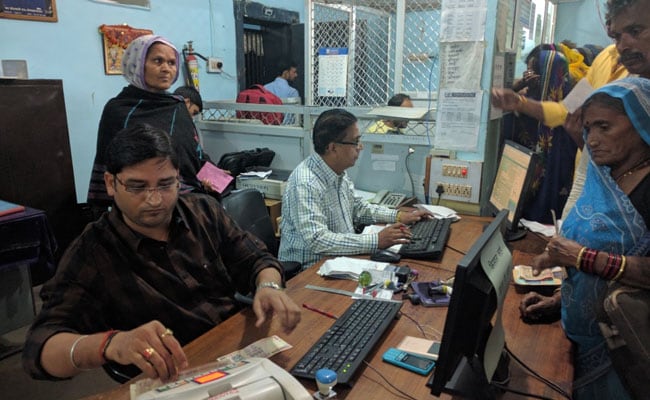Varsha was admitted to a hospital and is being treated for exhaustion.
Bundelkhand/Ahmedabad:
After 17-hour workdays for over a week, 45-year-old Varsha, a cashier at a Bank of Baroda Branch in Ahmedabad could take it no more. She collapsed while handing out cash to a customer on Saturday.
She was admitted to a hospital and is being treated for exhaustion. The CCTV footage of her collapse while on duty is a reminder of the hardships being faced by people after government's decision to scrap Rs 500 and 1,000 rupee notes to curb India's black money economy.
In the last few days, lakhs of people across the country have felt the impact of the clean-up act. New 2,000 and 500 rupee notes are in short supply and most ATMs, not yet calibrated to fit the new currency notes, can only dispense the money in 100s.
People have queued up outside banks and ATMs across the country for hours to exchange their old currency and withdraw the limited cash allowed per day.
The government claims there is adequate cash in the system. But on the other end of the spectrum are bank employees, who have worked almost continuously for the last 10 days, sometimes even at the cost of personal emergencies.
Varsha, who has not yet got a change to exchange her old currency notes, says that she had been on call almost 24x7 ever since the currency ban was announced leading to massive crowds and chaos at banks.
"For days together we have been working from 9 am to till about 1 am with barely a ten minute break."
People in rural areas, less acquainted with the use of plastic money, have been the worst hit; many of them have spent days in bank queues to get the new currency. This also means more work for the banks..
30-year-old Satish Soni, the manager at the Central Bank of India's Talbehat branch in rural and impoverished Bundelkhand has been able to manage 4-5 hours of sleep a day in the last week. But despite the challenges, he says he's excited to execute the government's cash clean-up on the ground.
"I had to travel to Lucknow on urgent personal work. I had even booked my train tickets but had to cancel them," says Mr Soni.
 In another rural bank in Bundelkhand's Mahoba district, lead cashier Vikrant Dubey, says his biggest worry is losing his temper. "I had only Rs 1,000 - 2,000 at home. We are still managing with that. There is no money. Whatever money there is, we give to customers. I get angry sometimes but these people are in bigger problems than us, so it's okay," says Mr Dubey.
In another rural bank in Bundelkhand's Mahoba district, lead cashier Vikrant Dubey, says his biggest worry is losing his temper. "I had only Rs 1,000 - 2,000 at home. We are still managing with that. There is no money. Whatever money there is, we give to customers. I get angry sometimes but these people are in bigger problems than us, so it's okay," says Mr Dubey.
Amid Opposition attack over the decision to ban higher denomination notes with poor planning, PM Modi has said his government is working relentlessly to mitigate the problems.
She was admitted to a hospital and is being treated for exhaustion. The CCTV footage of her collapse while on duty is a reminder of the hardships being faced by people after government's decision to scrap Rs 500 and 1,000 rupee notes to curb India's black money economy.
In the last few days, lakhs of people across the country have felt the impact of the clean-up act. New 2,000 and 500 rupee notes are in short supply and most ATMs, not yet calibrated to fit the new currency notes, can only dispense the money in 100s.
People have queued up outside banks and ATMs across the country for hours to exchange their old currency and withdraw the limited cash allowed per day.
The government claims there is adequate cash in the system. But on the other end of the spectrum are bank employees, who have worked almost continuously for the last 10 days, sometimes even at the cost of personal emergencies.
Varsha, who has not yet got a change to exchange her old currency notes, says that she had been on call almost 24x7 ever since the currency ban was announced leading to massive crowds and chaos at banks.
"For days together we have been working from 9 am to till about 1 am with barely a ten minute break."
People in rural areas, less acquainted with the use of plastic money, have been the worst hit; many of them have spent days in bank queues to get the new currency. This also means more work for the banks..
30-year-old Satish Soni, the manager at the Central Bank of India's Talbehat branch in rural and impoverished Bundelkhand has been able to manage 4-5 hours of sleep a day in the last week. But despite the challenges, he says he's excited to execute the government's cash clean-up on the ground.
"I had to travel to Lucknow on urgent personal work. I had even booked my train tickets but had to cancel them," says Mr Soni.

Satish Soni says he’s excited to execute the government's cash clean-up on the ground.
Amid Opposition attack over the decision to ban higher denomination notes with poor planning, PM Modi has said his government is working relentlessly to mitigate the problems.
Track Latest News Live on NDTV.com and get news updates from India and around the world

